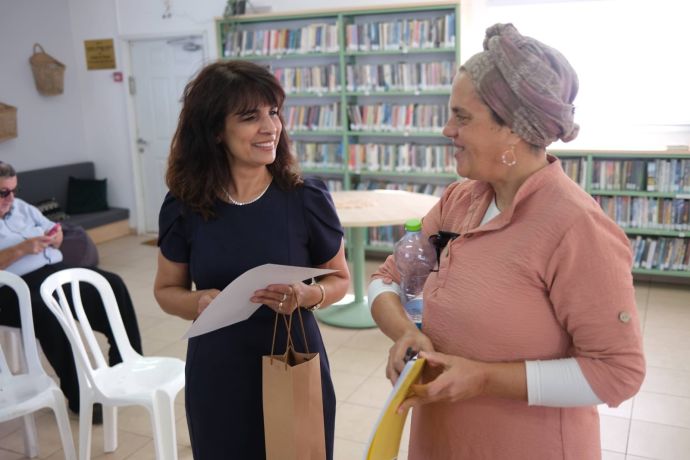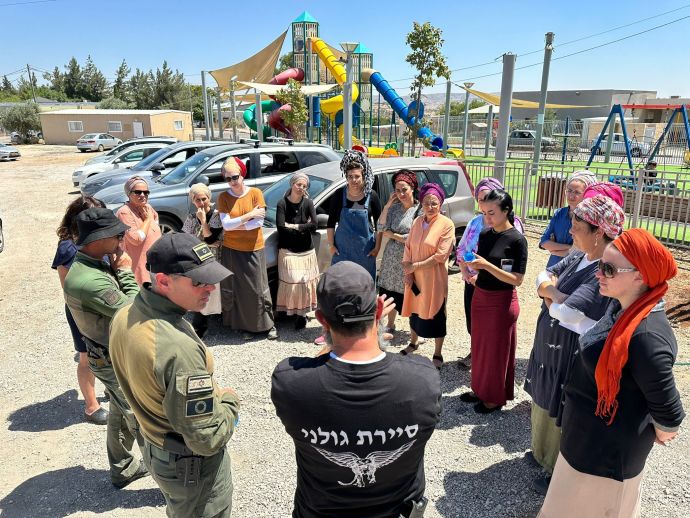Drive-by shootings, car ramming, stones hurled at passing cars, highways blocked by rocks, and tires set alight on roads – for years, residents of towns and settlements in Judea and Samaria have learned to deal with the grim reality of terrorism on the roads. Unfortunately, in recent months there has been an increase in these incidents.
For many, the current unsafe situation was tragically brought home by the murder of Lucy Dee and her daughters Maia and Rina, aged 15 and 20, on April 7 in the Jordan Valley. Palestinian terrorists opened fire at their car, causing it to crash on the shoulder of the highway. The terrorists then opened fire at point-blank range, killing the two sisters and critically wounding their mother, who died several days later.
Despite the outrage that resulted from the murders, terrorist activity has continued. Thirty-four Israelis have been murdered thus far in 2023 by Palestinian terror attacks. Recently, Shurat HaDin, which over the past 22 years has been working with Western intelligence agencies, law enforcement branches, and a network of volunteer lawyers across the globe on behalf of victims of terror and their families, has embarked on an ambitious program to prevent roadside terror attacks.

The program comprises a series of Emergency Survival Driving courses that are being given throughout Judea and Samaria, to teach drivers how to survive if they are attacked while driving. The course is taught by former military commanders with experience in the field, who work at the Wingate Institute and Caliber 3, an academy that provides counter-terrorism, security, and defense training.
“Shurat HaDin fights terrorism usually after it happens,” explains Nitsana Darshan-Leitner, founder and president of the organization, “to obtain compensation, punish the terrorists, and find them accountable. This time, we decided to fight terrorism before it occurs.

“The number of incidents of stone-throwing, Molotov cocktails, and shootings is increasing on the roads of Judea and Samaria, and residents of this area and whoever drives in this area feels like sitting ducks,” she adds. “When you leave the house, you never know if you will come back alive.”
While the Israeli government has stationed soldiers at road junctions, it is still not enough, she says, to stem the tide of attacks.
“We decided to do something,” declares Darshan-Leitner. “By representing terror victims, we learned that the human factor has an effect when it comes to lone wolf terror attacks.”
She cites the case of David Stern, a former US Marine living in the settlement of Itamar, whom Shurat HaDin represents, who was shot in front of his wife by a Palestinian gunman in the town of Huwara in March. Though wounded, Stern, a firearms instructor, maintained his composure, returned fire at his attacker, and survived.
Darshan-Leitner then returns to the tragic case of Lucy Dee, who, after being shot, lost control of her car, and was murdered along with her daughters. “We decided to train people how to drive while under a terror attack and save themselves. We organized courses taught by professional trainers free of charge to residents of settlements in Judea and Samaria.”
She explains that many terrorist attacks that occur on the road become even more severe when drivers lose control of their car or panic and get into an accident. “People usually are not killed by the initial bullets or rocks but rather from what happens after they crash, or they lose control or stop the car and panic. This is the human factor,” she says.
Shurat HaDin brings the courses to settlements by first contacting the settlement head or town secretary, and bringing everything that is needed for the four-hour class, which is usually held on Fridays or Sundays. To date, the course has been offered in 15 settlements, and Darshan-Leitner says that an additional 25 have expressed interest in the class. “Our goal is to reach 10,000 people in Judea and Samaria,” she says, “and we are booked for the next two months.”
Maayan Margalit, 29, coordinates culture and absorption in Dolev (population 1,500), a settlement located 27 kilometers northwest of Jerusalem. Margalit grew up in Holon and lived in Ashkelon and Eli before moving to Dolev a year ago. She is married and has three children, aged five, three, and one.
“Anyone who lives in Judea and Samaria knows and understands why we need the tools provided by the Emergency Survival Driving course,” she says. “If you are driving in Holon or any other city, you can stay away from people trying to overtake you; but in these areas of Judea and Samaria, it is more serious. It is important to know how to behave in dangerous situations that can occur on the road. What do you do if you have three children sitting in the back of your car and you have to get somewhere? An attack can happen at any time, day or night. How do you protect yourself?”
In the past two months, Margalit herself experienced two difficult situations while driving. “In August,” she recalls, “I drove to Ashdod to visit my sister. I encountered a driver who I didn’t initially think was Arab, and I thought he wanted to go into my lane to pass me.” The car rapidly approached Margalit’s vehicle, and she said, “He was either going to hit my car and injure my children, or I would have to move into the lane of traffic that was coming toward me.” Somehow, her car was not hit, and she survived.
Just a few weeks ago Margalit, as the coordinator for culture in her town, went with several residents to organize a hike in the area. “When we went to plan out the route, there were stones on the road. I had to decide what to do. If I were to leave the car to remove the stones from the road, they [terrorists] might be waiting in ambush. I could continue to drive and get a flat tire from the stones, but I could save my life because I would be in the car.”
Although Margalit’s husband, who grew up in the area, had given her some training in emergency driving conditions when attacked, she took the course offered in Dolev as part of her work in coordinating cultural activities. She recounts some of what she learned in the course:
First, it is essential to have a fully charged cellphone in the car at all times. Second, one should drive with the windows closed, in case a Molotov cocktail is thrown, to prevent the inside of the car from catching on fire. Third, if one encounters stone throwers while driving, it is best to slow down a bit, as a car traveling at high speed that is hit by stone may result in a broken windshield. Fourth, if gunshots are coming from a passing vehicle, stop immediately. It is essential to keep one’s head down, call the authorities immediately, and then drive to a place of safety as soon as possible.
Margalit reports that 40 people in Dolev signed up for the course, with registration filling up faster than any other cultural activity that had been held. The students practiced on a road outside the settlement that was blocked off.
The instructors divided the students into two groups – one of “terrorists” and one of “drivers.” Instead of throwing stones, ping-pong balls were thrown, and paint ball guns were used to simulate actual gunfire. The students were taught to drive through tires burning on the road, as they would not damage their cars.
After the course, the instructors provided written material for the students to study. After taking the course, will Margalit know what to do should she encounter a terror emergency on the road? “Yes, with God’s help,” she says with a smile. “I know much more now, and taking the course has provided a sense of security,” she says.
“I want to thank Shurat HaDin for providing this course,” she continues. “We shouldn’t need to utilize these lessons.”
Margalit confesses that she has experienced symptoms of post-traumatic stress since the two episodes described earlier. “We live in a beautiful place in Israel with wonderful people, and some people want to harm others. It is a complicated existence and reality.”
More information about the emergency driving courses can be obtained by writing to Shurat HaDin at info@israellawcenter.org. In addition, says Darshan-Leitner, the organization is seeking financial support to continue offering the courses.
This article was written in cooperation with Shurat HaDin.
